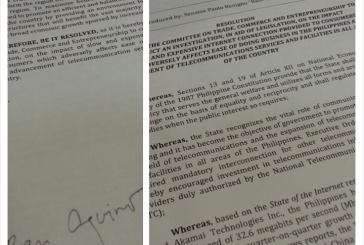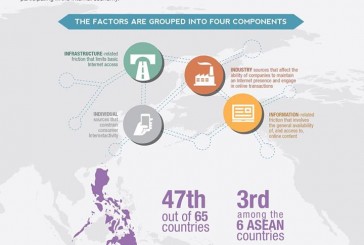Sen. Bam: Slow Internet Affects Business Growth
Slow Internet connection adversely affects ease of doing business and hampers the advancement of telecommunication services and facilities in all areas of the country.
This was emphasized by Senator Bam Aquino as he formally filed a resolution calling on the Committee on Trade, Commerce and Entrepreneurship, which he chairs, to investigate the slow and costly Internet service in the country.
In his resolution, Aquino reiterated the need to ensure that all users of Internet services shall have access to it anytime and anywhere in the country at an acceptable standard of service and at a reasonable cost.
Aquino made the move after it was reported that the Philippines is at the bottom of the list of ASEAN countries (3.6 Mbps) in terms of Internet speed, way below the ASEAN average of 12.4 Mbps.
A report by the Massachusetts-based Akamai Technologies Inc. entitled State of the Internet mentioned that the Philippines’ low use of broadband technology as well as high costs for internet users compared to other countries mean slow average connection speeds for consumers.
A study commissioned by the Internet Corporation for Assigned Names and Numbers (ICANN) and released by Boston Consulting Group (BGC), saying the Philippines is trailing its ASEAN neighbors in terms of Internet infrastructure.
The study also mentioned that the Philippines has the eighth most-expensive fixed broadband pricing among 65 countries included in the study.
Also, Aquino took notice of the expensive Internet service in the country where Filipino consumers spend around One Thousand Pesos (Php 1,000.00) per month for speed up to two (2) Mbps and around Two Thousand Pesos (Php 2,000.00) for speed up to five (5) Mbps.
“Comparing the prices of Internet services among Southeast Asian countries, the cost to Filipino consumers is way more expensive than the Internet costs in Singapore and Thailand, which have the fastest connections globally,” said Aquino.
The senator said improving Internet connection in the Philippines is crucial to the ASEAN Economic Integration, which aims to transform the region into a single market and production base, and a highly competitive region.
“We should provide an environment for the emergence of communications structures that will benefit the vast majority of consumers in the country which has a broad economic growth geared towards increasing competition,” Aquino stressed.





Recent Comments